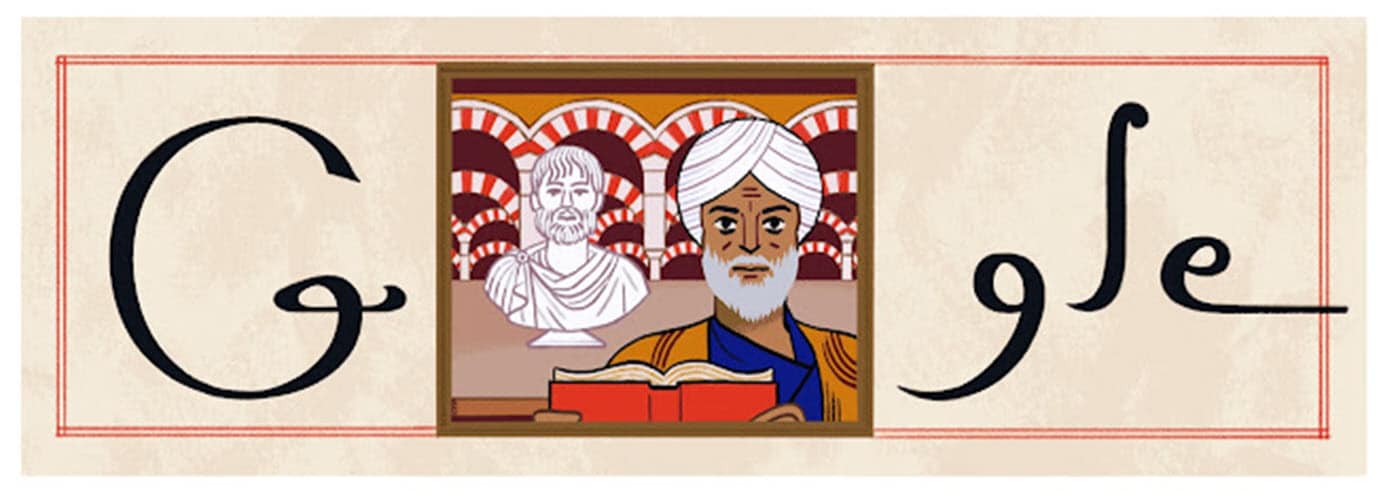Averroes: Philosopher of the Islamic Golden Age

Image Courtesy: Google Doodle
Averroes (14 April 1126 – 11 December 1198) was a medieval Muslim polymath who made significant contributions in various fields, including philosophy, medicine, law, and astronomy. He lived during the Islamic Golden Age and is widely regarded as one of the most influential scholars in the history of Islamic philosophy.
Life and Career
Averroes was born on 14 April 1126 in Cordoba, Spain, which was then part of the Al-Andalus region, a Muslim-ruled territory known for its rich intellectual and cultural heritage. He came from a prominent family with a long tradition of scholarship, and his father and grandfather were both respected scholars. Averroes received a comprehensive education in various fields of knowledge, including Islamic jurisprudence, philosophy, medicine, and astronomy. He studied under renowned scholars of his time and mastered the works of classical Greek philosophers such as Aristotle and Plato, as well as Islamic scholars like Al-Farabi and Avicenna.
Averroes is best known for his work in philosophy. He was a proponent of Aristotelian philosophy and sought to reconcile Greek philosophy with Islamic thought. He wrote extensive commentaries on Aristotle’s works, including “The Commentator” on Aristotle’s “Organon,” which became a standard text in medieval Europe. Averroes also developed his own philosophical ideas, including his famous concept of the “double truth,” which posited that religious and philosophical truths could coexist even if they appeared to contradict each other.
Averroes was also a renowned expert in Islamic law and jurisprudence. He served as a qadi (judge) in Cordoba and was known for his fair and impartial judgments. He wrote several legal treatises, including “The Distinguished Jurist’s Primer,” which became a significant work in the field of Islamic law. Averroes made notable contributions to the field of medicine. He wrote extensively on medical topics, including works on anatomy, pharmacology, and medical ethics. His medical writings were highly regarded and widely studied during his time and beyond.
Averroes also made significant contributions to astronomy. He wrote commentaries on the works of Ptolemy and other Greek astronomers, and he made original observations and calculations. He also proposed innovative ideas on topics such as the nature of the Milky Way and the possibility of the Earth’s motion, which were ahead of his time.
Averroes served as a political advisor to several rulers and was known for his expertise in matters of governance. He advocated for the separation of powers, with a division between the powers of the ruler and the powers of the judiciary, which influenced later political theories. Averroes’ works were widely studied and had a significant impact not only in the Islamic world but also in medieval Europe, where his ideas influenced scholars such as Thomas Aquinas and other Christian philosophers. However, some of his views were considered controversial, and his works were banned and suppressed at times due to conflicts with conservative religious authorities. He died on 11 December 1198 in Marrakesh, Almohad Caliphate.
Award and Legacy
Averroes’ legacy is significant and continues to be recognized today. His contributions to philosophy, medicine, law, astronomy, and governance have had a lasting impact on the fields of knowledge and continue to be studied and debated by scholars around the world. He is considered one of the great thinkers of the Islamic Golden Age and a prominent figure in the history of Islamic philosophy and scholarship. On 14 April 2014, Google celebrated Averroes’ 888th Birthday with a doodle.
Observer Voice is the one stop site for National, International news, Sports, Editor’s Choice, Art/culture contents, Quotes and much more. We also cover historical contents. Historical contents includes World History, Indian History, and what happened today. The website also covers Entertainment across the India and World.

